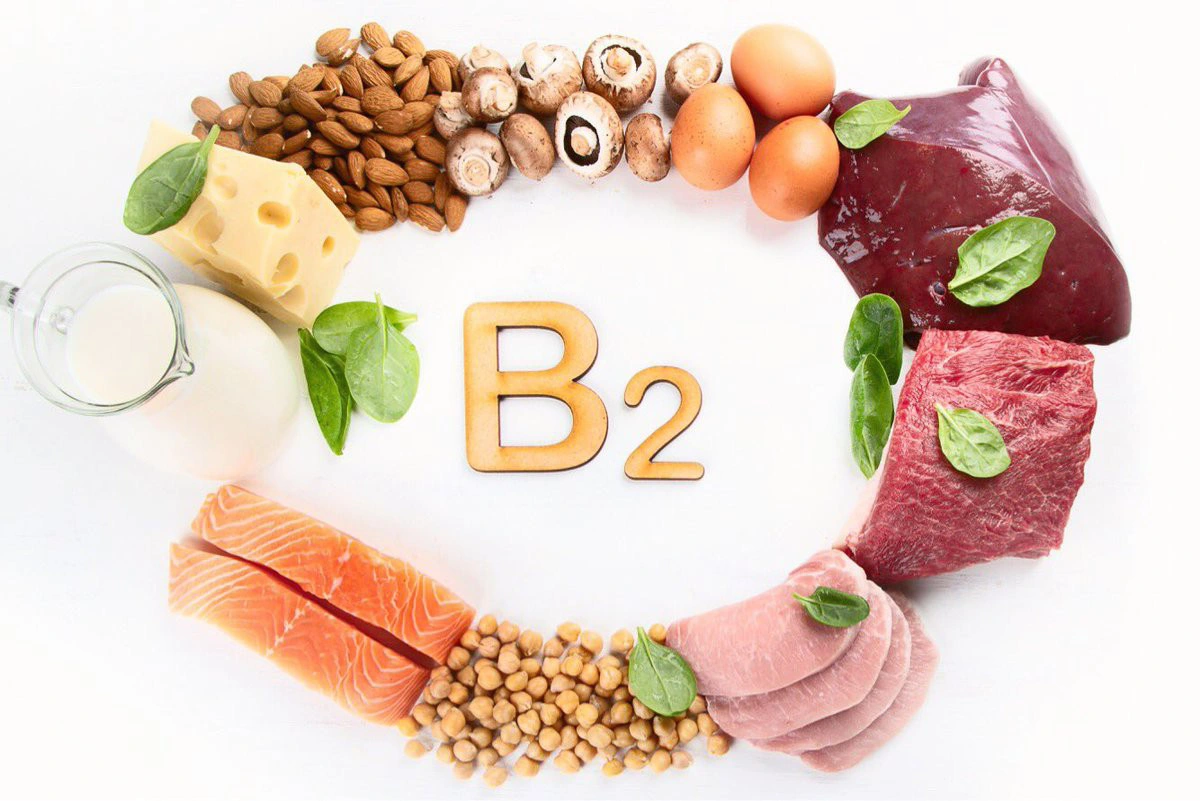Vitamin B2 is an essential nutrient that your body cannot make on its own, so you need to get it from your diet or supplements. Vegetarians, pregnant or breastfeeding women, and others at risk of deficiency may want to monitor their diet closely to ensure they are getting enough through foods high in vitamin B2. This article lists the benefits, side effects, and foods rich in vitamin B2 to add to your shopping list.
1. What is vitamin B2?
Vitamin B2 (vitamin B2) is a water-soluble vitamin that is involved in energy metabolism and a variety of cellular processes. It works by helping the body use other B vitamins such as niacin and thiamine, so we can produce energy from the foods we eat.
In particular, vitamin B2 functions as a major component of two important coenzymes in the body: flavin mononucleotide (FMN) and flavin adenine dinucleotide (FAD). Each coenzyme is involved in energy production, maintaining cell function, and promoting proper growth and development. They are also used to convert tryptophan to niacin and produce pyridoxal 5-phosphate from vitamin B6 foods.
Vitamin B2 is also needed to maintain normal levels of homocysteine in the blood, an amino acid that may be linked to the development of heart disease. It is also used to help treat lactic acidosis, a serious condition characterized by a buildup of lactate in the blood and a decrease in pH levels.
A deficiency in vitamin B2 can lead to cracked and red lips, stomatitis, mouth ulcers, sore throats, and even iron deficiency anemia. Because vitamin B2 supports many enzymes with various daily functions in the body, a deficiency can lead to health problems. Animal studies have shown that brain and heart disorders and some cancers can develop from long-term vitamin B2 deficiency.
Vitamin B2 is a water-soluble vitamin that is well-regulated by the body, is usually used immediately and is not stored in the body, as excess amounts are excreted in the urine, so overdose is rare and usually only occurs with vitamin B2 injections or supplements, excess vitamin B2 can cause urine to be bright yellow.
Studies show that vitamin B2 can help promote heart health, prevent migraines, and even protect against cancer. And best of all, this essential vitamin is found in many foods that contain vitamin B2, such as meat, milk, eggs, and some vegetables, making it easy to meet your needs.
2. Foods High in Vitamin B2
- Beef and beef liver: 0.9 mg of vitamin B2 per 100 grams; Beef liver – 3 ounces: 3 milligrams (168 percent DV)
- Tofu: 0.4 mg of vitamin B2 per 100 grams; Many soy products have even more vitamin B2: 79% DV in a 16-ounce glass of soy milk, 46% DV in 1 cup of tempeh, 38% DV in 1 cup of green soybeans.
- Milk: 0.2 mg of vitamin B2 per 100 grams. Many dairy products have even more vitamin B2: 44% DV in 1 cup of nonfat yogurt, 32% DV in 1 cup of skim milk, 22% DV in 4 ounces of low-fat cottage cheese.
- Salmon: 0.5 mg per 100 grams of salmon. Many fish and seafood are also rich in vitamin B2, such as: 48% DV in 20 small clams, 40% DV in 6oz tuna fillet, 29% DV in 3oz oysters.
- Mushrooms: 0.5mg of vitamin B2 per 100g. Many mushrooms are high in vitamin B2, such as portabella mushrooms (38% DV in 1 cup), crimini mushrooms (33% DV in 1 cup crimini mushrooms), 23% DV in 1 cup oyster mushrooms.
- Lean ground pork: 0.3mg of vitamin B2 per 100g, other pork products high in vitamin B2 include lean grilled ham (36% DV in 1 cup), 35% DV in country-style rack of ribs, 25% DV in 3oz pork loin.
- Spinach : 100g of spinach contains 0.2mg of vitamin B2, in addition, there are many vegetables containing vitamin B2 such as beet greens (32%DV in 1 cup of vegetables), 19%DV in 1 cup of asparagus, 18%DV in 1 cup of peas.
- Almonds: 100g of almonds contains 1.1mg of vitamin B2, there are many nuts and liquids with higher vitamin content such as chestnuts (11%DV in 10 chestnuts), 11DV in 1 cup of coconut water, 8%DV in 1oz of dried sunflower seeds.
- Avocado : 100g of avocado contains 0.1mg of vitamin B2, many fruits contain vitamin B2 such as bananas, grapes (8%DV in each cup of bananas and grapes), 6%DV in 1 cup of oranges.
- Eggs: 100g of eggs contains 0.5mg of vitamin B2

Beef is one of the foods rich in vitamin B2.
3. Health Benefits of Vitamin B2
3.1. May Protect Against Cancer
Cancer is a big problem in the United States and around the world. In fact, an estimated 1.7 million people will be diagnosed with cancer in the United States and more than 600,000 people will die from the disease in 2018 alone. While it’s clear that eating plenty of cancer-fighting foods can have a big impact on reducing your risk of cancer, some studies have also shown that eating a few foods that contain the important vitamin B2 may also protect against cancer development and growth.
For example, one study found that higher vitamin B2 intake was associated with a reduced risk of colorectal cancer, especially in people with the methylenetetrahydrofolate (MTHFR) TT genotype, which is a specific gene involved in the conversion of folate. Meanwhile, another small study analyzed the intake of people in certain parts of Iran and concluded that vitamin B2 deficiency may be associated with a nearly doubled risk of developing esophageal cancer.
3.2. Providing Migraine Relief
Migraines are a type of recurring headache that is often accompanied by symptoms such as pain, dizziness, irritability, and sensitivity to light or sound. While they are often treated with over-the-counter medications and lifestyle changes, some studies have shown that eating more foods containing vitamin B2 may also help relieve and reduce the duration and severity of symptoms.
A review of 11 articles concluded that vitamin B2 supplementation is effective in reducing the duration and frequency of migraine symptoms with minimal risk of side effects. Another study had similar findings, showing that taking high doses of vitamin B2 halved the frequency of migraines and reduced the need for medication after just three months of treatment.
3.3. Maintain healthy hair and skin
As the most abundant protein in the body, collagen makes up a large part of your muscles, skin, bones, joints, hair, and nails. Because vitamin B2 plays a role in regulating collagen levels in the body, including plenty of vitamin B2-rich foods in your diet can help keep your hair and skin healthy.
Studies have shown that collagen can help improve skin elasticity and moisture. Research has also shown that collagen may benefit hair health, with one animal model reporting that collagen was effective in promoting hair growth in mice.
3.4. Boost heart health
One of the most impressive benefits of vitamin B2 is its powerful effects on heart health. Vitamin B2 works by regulating levels of homocysteine, an amino acid found throughout the body. When homocysteine builds up in the blood, it can cause arteries to narrow and increase the risk of heart disease, so keeping homocysteine levels under control is important.
Several studies have demonstrated the direct impact that vitamin B2 may have on heart health. For example, an animal model published in the journal Heart International found that treatment with vitamin B2 improved heart function in mice with diabetic heart failure. Meanwhile, other studies have found that vitamin B2 deficiency is more common in people with heart disease and that this deficiency may be linked to a higher risk of congenital heart defects.
3.5. Acts as an antioxidant
Antioxidants are compounds that help neutralize free radicals and protect against cell damage to keep your body healthy. Research also suggests that antioxidants may play an important role in disease prevention and reducing the risk of chronic conditions like cancer and heart disease.
While micronutrients like vitamin C are better known for their antioxidant properties, vitamin B2 may also act as an antioxidant, helping to reduce oxidative stress and promote better health. In particular, studies have shown that vitamin B2 prevents lipid peroxidation and reperfusion oxidative damage, both of which can damage your cells and contribute to chronic disease.

Vitamin B2 helps improve cardiovascular health
4. Signs of Vitamin B2 Deficiency
A deficiency in this important vitamin can have a number of serious health effects. However, vitamin B2 deficiency alone is rare. Instead, vitamin B2 deficiency is often accompanied by deficiencies of other water-soluble vitamins, such as thiamine and niacin.
People who are alcoholics are at higher risk of deficiency due to both reduced intake and impaired absorption of the vitamin. Additionally, people who do not consume meat or dairy and those on a restricted diet may be at increased risk or those who are malnourished.
Some of the most common symptoms of vitamin B2 deficiency include:
- Sore throat
- Cracked lips and corners of the mouth
- Swollen tongue
- Scalpy skin
- Redness of the lining of the mouth and throat
- Weakness
Groups at higher risk of deficiency:
- Vegetarians/vegetarians who eat less or completely eliminate dairy products and meat.
- Pregnant women, especially those who consume little milk (lactose intolerance) or meat, due to increased nutrient needs with the growing fetus.
Vitamin B2 levels are not usually included in routine blood tests, so it is important to talk to your doctor if you notice any symptoms or are at increased risk of vitamin B2 deficiency. Together, you can determine the best course of treatment to ensure you are getting enough vitamin B2 to meet your needs.
5. Side effects
Because vitamin B2 is a water-soluble vitamin, there is the lowest risk of toxicity as excess amounts are excreted in the urine. In fact, one study even showed that giving participants 400 milligrams of vitamin B2 per day, which is 200 times higher than the recommended daily value, did not result in negative side effects.
While vitamin B2 supplements are available, including more vitamin B-rich foods in your diet is often a better option. These vitamin B foods not only contain a good amount of vitamin B2, but also provide a range of other important vitamins and minerals that can help improve your health.
If you suspect you may be deficient in vitamin B2, it is best to speak to your doctor to determine the best course of treatment. Since vitamin B2 deficiency often occurs alongside other micronutrient deficiencies, you may also require supplementation with other B vitamins.





